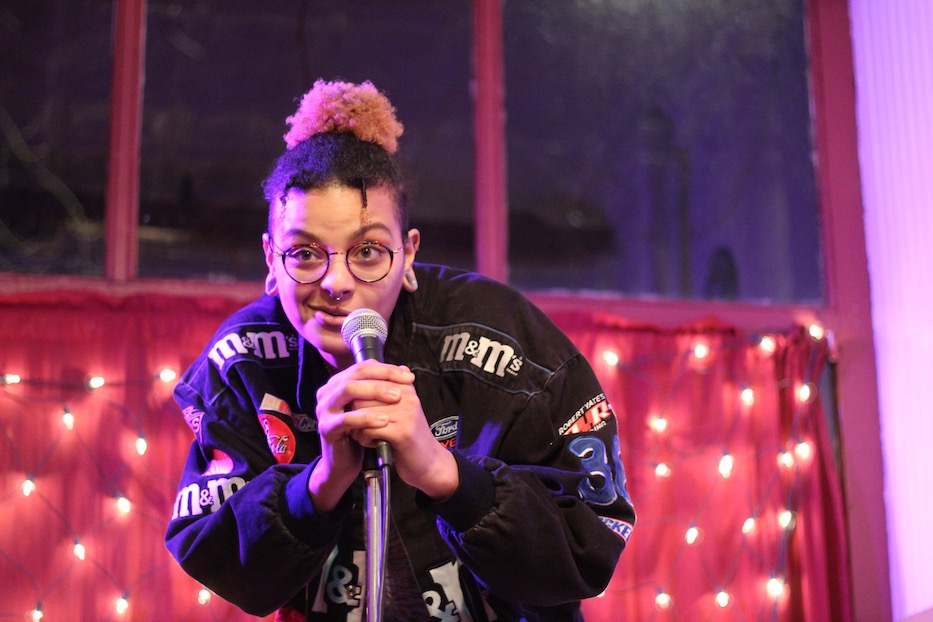
Culture & Community | East Rock | LGBTQ | Arts & Culture | Never Ending Books | Comedy | East Rock House
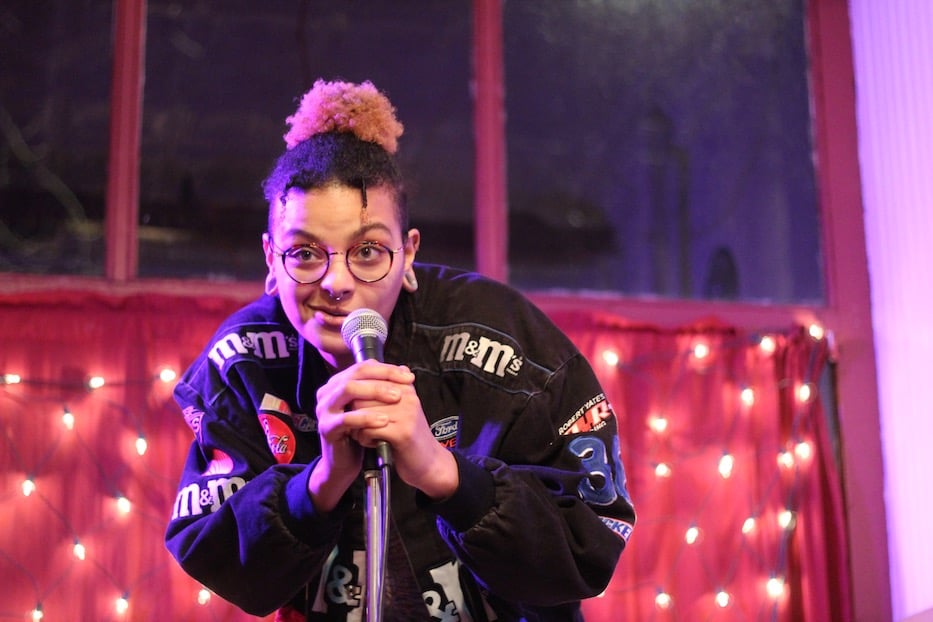
Victoria Harriott. Lucy Gellman Photos.
Victoria Harriott was on a roll. Leaning into the mic, she recalled sitting at the table with her mother, listening to her list the virtues of an all-girls Catholic high school. Sisterhood and solidarity. Supportive community. A space to bloom intellectually.
“She was really selling to the gay in me,” Harriott said, scrunching her brows just a little. Giggles bubbled up through the space, wrapping around folding chairs, twinkling holiday lights and packed bookshelves one room over. Nothing was sacred here—and that was the point.
Storytelling, laughter, and a few well-timed shrieks filled Volume II: A Neverending Books Collective Saturday night, as East Rock House staged its inaugural queer comedy night at the 810 State St. venue. In just over an hour, it centered the healing power of laughter—and the use of comedy to reclaim narratives that were once awkward, painful, or taboo. Performers included Shelby Juarez, Martyn the Poetic Cynic, and Harriott.
Before the night was over, stories of coming out, of Grindr bans and incessant right swipes, of finding chosen family and warding off nosy pseudo-bicurious neighbors had all graced the stage.
“Comedians have to be able to walk into any place, assess the crowd, and be able to make them laugh,” said Harriott, who was performing Saturday for the first time in 12 years. “Being bi and gay isn’t something that I’m super open about,” and comedy gives her a safe space to talk about it. “I hope I can do this again.”
From the beginning of the night, a kind of warm, soft excitement crackled through the space, a creative hub that grew out of the closure of Neverending Books in December 2020. As friends caught up among the bookshelves and comedians ran over bits of their routines one last time, organizers Luke Devereux and Ashley LaRue set out folding chairs. Behind the stage, strands of light dripped down the street-facing windows, casting a warm glow over the room.
Attendees trickled in, dozens sitting shoulder-to-shoulder as some slipped on masks and settled in for the performance. Harriott, who lives in Stamford, hopped onstage and checked the mic. “Is this thing on?” she asked no one in particular. A few chirps of Woo! And Yes! Popped up from different corners of the room. By the stage, three latecomers took the last open seats in the house, two of them squeezing onto a piano bench.
“I’m single and ready to mingle!” Harriott said to a few laughs, adding that she had just reactivated the dating apps on her phone. Then as the night’s impromptu emcee, she welcomed Juarez to the mic. The room filled with applause, and then just as quickly, the sound of a single voice.
“Three Things You Need To Know”
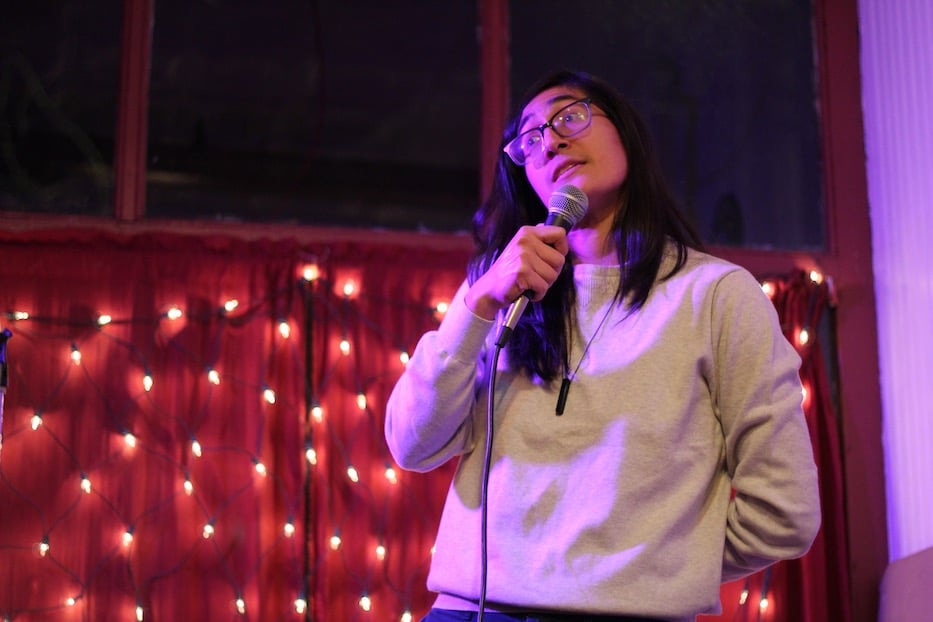
Shelby Juarez: "It was terrible!" they said of high school, which is now part of their routine, after the show. "It was confusing! It was awkward! There was suffering. It was like, 'When will this be over?'"
An apprentice welder and Trader Joe’s employee by day, Juarez looked to storytelling as a gentle, sometimes barbed path to comedy. Wrapping one hand around the mic, they jumped right in. “There are three things you need to know about me,” they said in a narrative stream that soon felt fluid. They looked out over the audience, and nearly every eye in the room looked back.
The first is that they are the oldest of four children, they said. The second is that their parents are immigrants. And the third is that they figured out they were queer early in life, thanks in part to a classmate in their homeroom who became their first crush.
At home and at school, “I was really good,” Juarez said. They excelled in their classes. They became a model sibling, doting on the younger members of the family. They were a fairly quiet kid, who filled their time with homework and games of Pokémon and legos.
And then they spotted them, in that thick and befuddling hormone-induced fog of middle school. “My first crush looked like they stepped out of a Hot Topic,” Juarez said. A few attendees tittered with the instant recognition of something from the not-so-far-away past. “They had that Slipknot Korn shirt—” more laughs filled the space.
Juarez did what good kids do, they said—which was to not profess their crush in any way. Instead, they were just friendly—really friendly—to the student. Giggles in at least six octaves now rose toward the ceiling, coming in waves toward the stage. It was easy to see Juarez as a kid, extending their friendship as a way to awkwardly say Hey, I like you. On a low bar stool at the front of the room, LaRue smiled as she snapped a photo, and the stool swiveled on its axis.
Juarez found the sharp edge of comedy as they continued. The student was the same sex, which meant in Juarez’ middle-school mind that they were off-limits. “I couldn’t get past or couldn’t see past heteronormativity,” they said.
Part of the comedy is the reveal, and Juarez lets theirs simmer. In middle school, Juarez’ parents sent them and a sister to Guatemala for the summer, where a therapist had them each take a Rorschach test. When Juarez walked into their office, they tried to unpack their sexuality in a single, stingingly blunt session.
“They said, ‘I want you to put a hand over your heart,’’' a disjointed chorus of awwwws filled the room. “Just kidding, that would have been sweet. They said, ‘I want you to put a hand over your genitals—’”
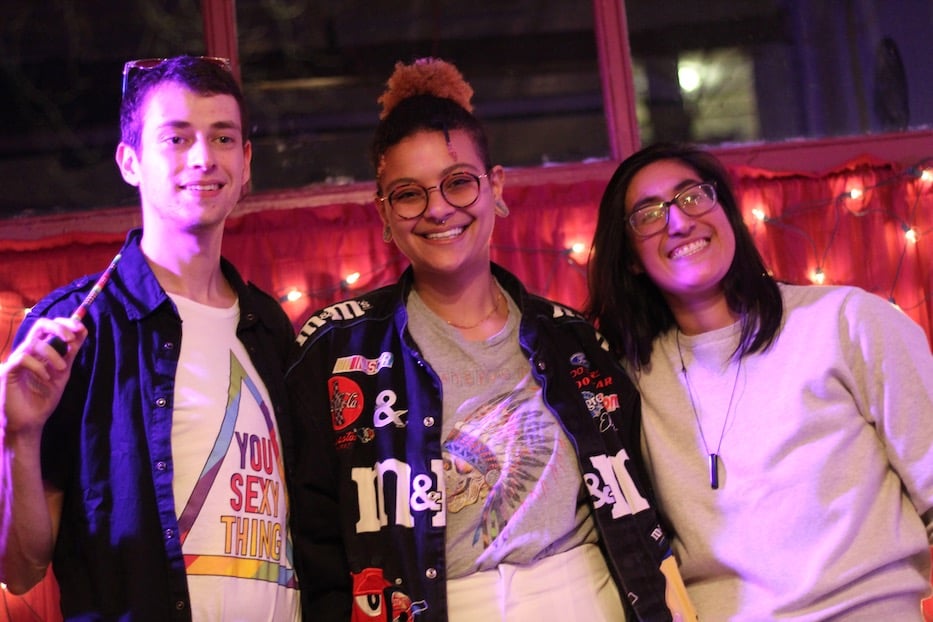
Martyn the Poetic Cynic, Victoria Harriott, and Shelby Juarez.
The laughter now took on a startled sound, some attendees sucking in air around them. It was like they knew what was coming. Instead, the therapist pushed them to talk about their sexuality, including how they identified. It was the first time Juarez grappled with what it might mean to be queer, before they had the language for it.
“There was no Lady Gaga. There was no RuPaul’s Drag Race. We still had ‘Don’t Ask Don’t Tell.’ We didn’t have gay marriage,” they said. Figuring out how to come out at the time wasn’t funny at all. Which, years later, is where the humor lives.
Juarez came out to their closest sibling first, “during the commercial previews right before the movie,” they said. A listener could imagine the pregnant silence that followed as a film rolled. Then they tried coming out to their mom in the front seat of a parked car, an awkward ballet that was sometimes lost in translation. Then they talked to their dad.
“My dad took it really well!” Juarez said to a few cheers that popped up around the room. They took on a deadpan, and the sound faded just as quickly. “Actually he didn’t, but I didn’t know that at the time.”
It was a reminder that comedy can have a sharp edge, and a sweet one too. They remembered learning that that classmate in homeroom was gay after all, meaning there were at least two queer kids in the grade. They remembered getting to college, and making a beeline to the rainbow flag. They remembered how touched they were by a conversation with their dad when they returned from college, and he asked gently about their romantic life.
“It was one of the bravest moments,” they said.
“Because I knew one other queer kid [in high school], I never felt alone,“ they continued. “And when I got to college, I was ready.”
In an interview after the show, Juarez pointed to the importance of having an intentional affinity space to perform. When they were living through the awkward churn of high school, they couldn't have imagined turning it into a comedy routine. Now, the sheer discomfort of that time is inherently funny, sometimes because it was so unfunny to live through.
"It was terrible!" they said with a smile after the show. "It was confusing! It was awkward! There was suffering. It was like, 'When will this be over?'"
Now that it is, it’s worth a laugh.
From Storytellers To Storybooks
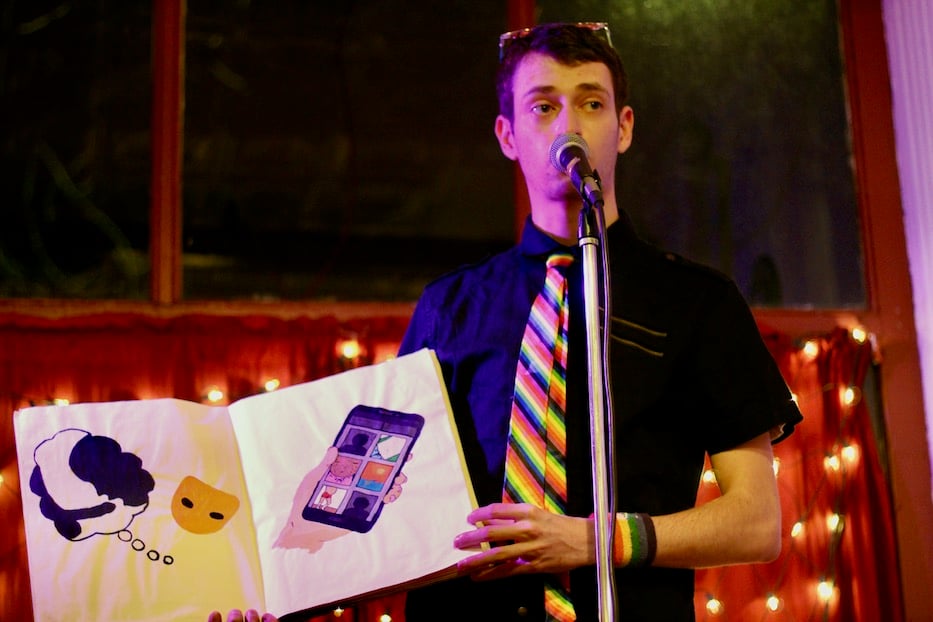
That’s it! I’m done! The night’s chastity kept/I put my phone down/Smoked some pot/And then slept.
Juarez’ performance opened the floor to multiple forms of comedy, all of them received with cheers from the audience. When he bounded up to the stage, Martyn the Poetic Cynic lifted a book into the air, its cover gleaming in silver glitter. For a moment, a viewer could have mistaken the room for a primary school, where the teacher had pulled a copy of Goodnight Moon from the bookshelf, and was preparing to read it for storytime. Hand-rendered illustrations waited inside.
If the audience had wondered if he would live up to his introduction—"he said keep it sweet, keep it short, I’m a twink who talks a lot,” Harriott had said moments before—they didn’t have long to wait.
He introduced the text as Wednesday Night’s Lament, “or that’s how I did not get laid,” a title that got the room buzzing before he even cracked open the front cover. Paging through the book, Martyn unfolded a story of lying alone in his room, wondering if he would ever have sex again. Flipping to the second page, he showed the glowing, enlarged screen of a cell phone, and the orange mask that has become synonymous with Grindr. Narrating to the audience, he reached for his phone, and began to scroll and swipe.
He turned the page with a rustle that came through the mic. The night wasn’t looking promising. A grid of four faces, from smiley to frowning, sent the audience into stitches.
I opened the app/dreading what I might find, he read
But I found a cute guy! With a cuter behind
He had a nice face/And abs hard as rocks
I was getting excited, ‘til he asked for pics of my socks
That’s it! I’m done! The night’s chastity kept
I put my phone down/Smoked some pot/And then slept
The room burst into applause. He closed the book, a rainbow tie peeking out from his open black button-down. When he unbuttoned it, it opened to a t-shirt with the words You Sexy Thing emblazoned in rainbow triangle.
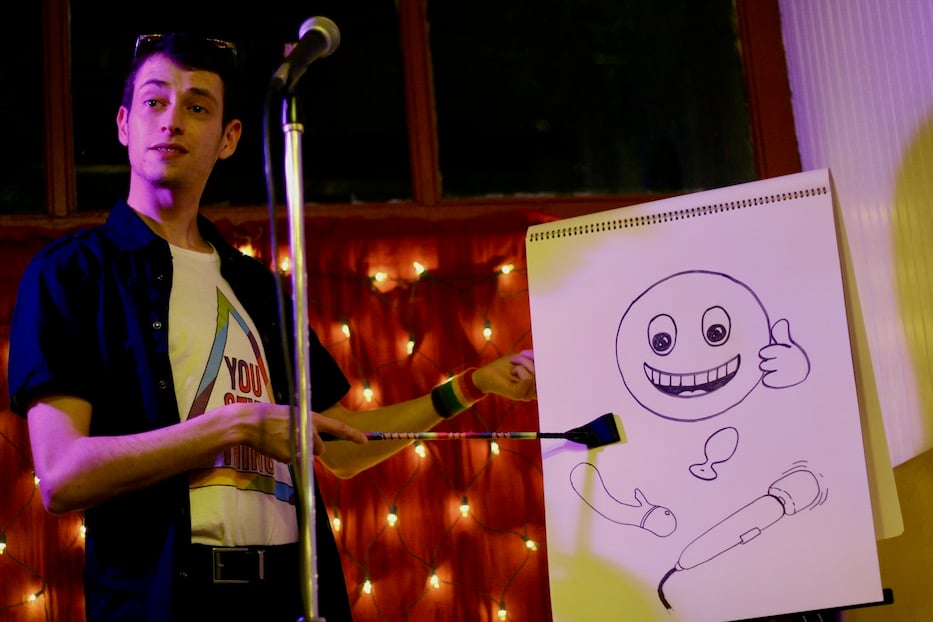
An image that ostensibly got him temporarily banned from Grindr.
“Have you ever had a random white guy explain your culture to you?” he asked as he peeled off a layer, and a howl went up from close to the stage. The line had landed with LaRue, who brand Qommunity is building space outside of that cis/het, white, mansplainy world. “My entire persona is like I’m the main character in a Greta Gerwig movie” about gentrifying Brooklyn, he joked. It was bracingly honest, and the audience went with it.
The joke wound its way into a routine with original poetry, artwork, self-effacing humor, and a history lesson constructed entirely around the history of sex toys (did you know about Cleopatra’s bee-powered dildo?). When one poem began “There is no character more tragic/Than the woman in gay porn,” some attendees cackled as others leaned in to hear what would come next. When he flipped through centuries of sexual pleasure in minutes, they chortled and learned at the same time. By the time he closed the set out with audience participation, it didn’t feel like it could be any other way.
“The T Stands For Tax Evasion”
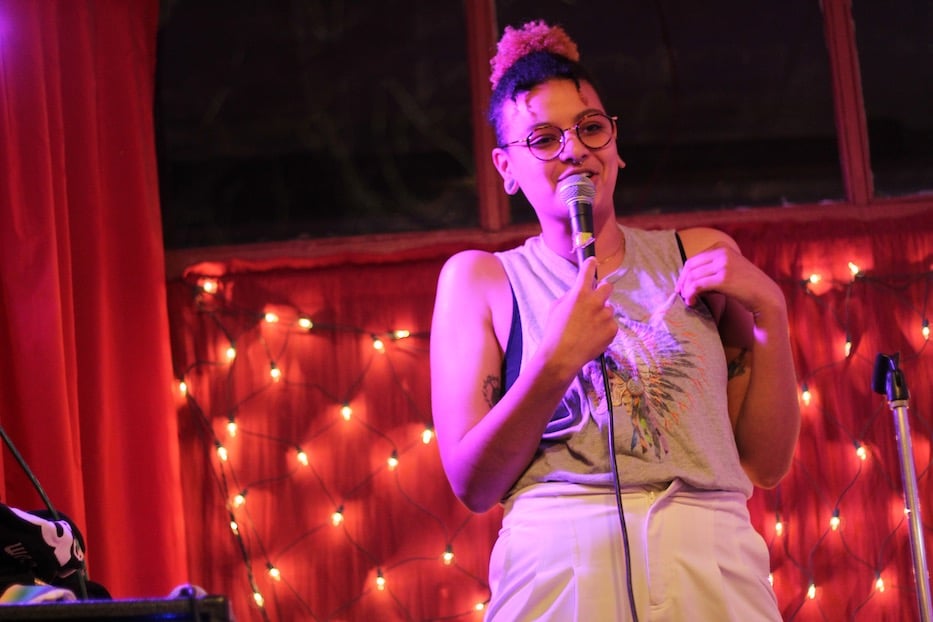
Victoria Harriott. "Here's the thing about millennials, you don't get funny overnight," she said at one point. "It takes years and years of trauma."
Shape-shifting from emcee to performer, Harriott brought it home with short, intimately funny vignettes that knitted a story of existing as a neighbor, a mom, a roommate, and a daughter. Taking the microphone, she steadied herself for a moment, then began an act that soared from horoscopes to Catholic school to parenting to anxiety with a no-nonsense, unflappable sort of sensibility.
“I’m so excited,” she said, thanking a few friends in the audience for coming out to see her (she and Juarez are roommates, and the two cheered each other on throughout the evening). “I gotta do a hard reboot like I’m a 1995 computer.”
She eased into her set, a string of jokes woven around that funny, beautiful mess of existing. A fan of horoscopes, Harriott joked that she’s recently been captivated by a video on TikTok that listed the astrological signs most likely to be a serial killer. Her sign, Taurus, “did get an honorable mention,” she said to a few chuckles. “Taurus is known for fraud,” which dovetails with the imposter syndrome she feels each day, she said. The honesty was the humor: laughs followed instantly.
The vulnerability stuck. She pushed it one step farther, drawing out deep laughs as she added “the T stands for tax evasion.”
She was just getting started. She transported the audience to Stamford, where she and Juarez keep an apartment with a welcome mat that reads “The Gayest Place In Town” (for years, her son thought it read “The Greatest Place In Town," which she said is basically synonymous with the real message) Recently, she’s noticed that a downstairs neighbor with a son around the same age has gotten very inexplicably friendly with her.
For what may have been the hundredth time that evening, giggles floated through the space. It was a familiar story for some attendees: that neighbor or classmate or friend who learns that an acquaintance is gay, and drops hints that they might want to experiment because they feel like they can. Harriott wasn’t having it.
She flowed easily between topics, jumping from a breakup during Pride Month in June ("Does that mean I'm not gay because I broke up with you during Pride?!") to her parenting style to anti-anxiety meds (“This one is for the heterosexuals in the audience because it’s about weed,” she said at one point). When she began to describe her experience with Catholic school, including a song about the religious origin of candy canes, a shout went up from somewhere in the fourth row, where an attendee sat near the wall.
Harriott nodded, a smile tugging at her mouth. “Shared trauma.” It was a laugh line that made the night feel like it could go on for hours.
That is the magic of comedy, she and fellow performers pointed out after the show. The intervention of technology on sex and dating is at times so absurd that it’s hilarious. Knowing the contours of depression and anxiety—which are not funny in themselves—make it easier to open up a conversation about Zoloft and Klonopin. Trying to make it through middle school is so herculean a task that it’s worth a guffaw—or ten.
Coming down from the show, Harriott remembered a classmate in high school who was side-splittingly funny, who made her realize that laughter had the power to diffuse tense situations. Over a decade later, she’s still working on the art of making those around her laugh. If she can do that, she suggested, she can do anything.
East Rock House's next event is a screening of Carol at Best Video Film & Cultural Center, 1842 Whitney Ave in Hamden, on Thursday, Jan. 19 from 6:30 to 9 p.m. The event is taking place in partnership with Best Video, the New Haven Pride Center and Hamden Pride. Follow them on Instagram for more information.

